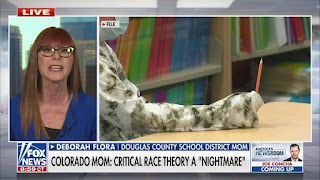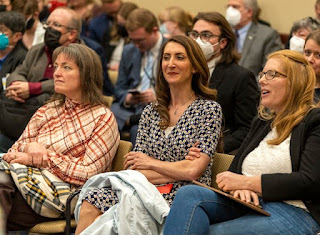Nationally, we're seeing a great surge of bad bills being proposed as pseudo-conservative legialtors rush to prove that they are the banniest, teacher-gaggingest legislators out there. And as always, we can find Florida providing an example of how that looks.
Here are just some of the bills under consideration in America's Swampland.
There is of course all the activity around Ron DeSantis's STOP Woke Act, which has a spectacular level of hostility toward public ed and teachers. But what else does Florida's legislature have up its sweaty sleeve? All icky, and I've saved the worst for last.
SB 148 Individual Freedom
The bill isn't exactly related individual freedom; it's just the Florida version of the critical race theory bans sweeping pseudo-conservative legislators. This forbids the usual list of naughty "discomforts" for both schools and businesses, so if you're a business owner, it's not your individual freedom that the GOP is concerned with. Also, abstinence education is in, but for some reason, the list of health education subjects hereby eliminates "mental and emotional health." and instead adds a requirement for teaching life skills like resiliency and self-awareness that "support mental and emotional health." Yes, the state legislature will now tell you what mental and emotional health entail.
The individual freedom part arrives at the end, where the bill takes the usual list of anti-crt boiler plate (nobody is inherently racist, meritocracy is fundamental to the pursuit of happiness, no individual is responsible for past bad stuff, no discomfort, etc) are now acknowledged and enshrined in education programs as the "principles of individual freedom." This is kind of mind blowing, but a fine codification of the pseudo-conservative belief that if you are less wealthy and less free than other folks, it's your own damned fault for failing to make good choices.
HR 1055: Video Cameras in Public School Classrooms
This dumb bill wants to install video cameras and body mics for teachers. These may be used to investigate an "incident," defined as "an event, a circumstance, an act, or an omission that results in the abuse or the neglect of a student" by either the teacher or another student. The camera should be mounted in such a way that it can cover the entire room, but not anywhere students change their clothes. If a district installs such a camera, they must inform everyone who could conceivably be affected.
There are protections in the bill for students, and they are dumb. When showing the video to involved parties, you should blur out the faces of other students, which provides little actual confidentiality ("Pat, who sits next to you in Mrs. Whinglebutter's room?") Presumably the bill is intended to give parents one more tool to catch teachers who are abusing their child with indoctrinatin' stuff, but it looks like an excellent tool for using the school to harass other ("Sam says that Winslow kid is causing trouble every day, so let's pull Winslow junior up on video, shall we?") There are no items in the bill about providing due process for the teachers or students who become the subjects of this increased surveillance. Stay tuned for teacher evaluation form that includes "number of times administration had to watch your tape."
SB 1300: Transparency etc
One of the side debates raging in Florida is what to do with school board pay. Before it gets into its real meat, this bill proposes making school board member salaries equal to the pay given legislators, which is not a hell of a lot (a useful method of keeping the poors out of government).
Any adoption or review of instructional materials must be public, and the committee must include parents. Library and school materials must be selected by professionals, and all materials must appear on line in a searchable format (otherwise, how can you check to see if your school has That Naughty Book you heard about on OAN).
All materials must be available to the public (including teacher editions), allowing the public to inspect and copy anything they wish (far use copyright laws apply, somehow). Adoption of materials must be a separate line item so that the public can comment on them. Also, submit a banned book report annually to the state ed chief. And the state must develop a training program so that folks have been taught How Not To Select Naughty Books.
HB 1467: K-12 Education
Is the sibling of SB 1300--except that it eliminates school board pay entirely. A sponsor thinks that will take the politics out of school board elections, somehow?
We want to make sure our schools are focused on parental engagement, parental involvement, and by eliminating, quite frankly, the financial incentive for politicians to use this as an opportunity either as a launching pad to a political career, or maybe a landing pad by which to get a salary.SB 244 is also aimed at school boards, but this one would make elections more partisan by requiring school board candidates to file by party affiliation. Because extreme party politics are definitely making America more greater these days.
SB 1348 is trying to clean up after the mess that Florida made when they combined and expanded their various voucher programs, creating a voucher behemoth that turned out to be a lumbering bureaucratic mess. So this bill is supposed to make it faster and more efficient to give public tax dollars to private education-flavored businesses and religious schools.
HB 1557 Don't Say Gay (SB 1834 is its counterpart)
Okay, it's actually called "an act relating to parental rights in education." This is perhaps one of the scariest bills out there. The headline making part of the bill is this one:
A school district may not encourage classroom discussion about sexual orientation or gender identity in the primary grade levels or in a manner that is not age-appropriate or developmentally appropriate for students.
Pat: Teacher, my older brother says he's gay, and I'm confused about what that means.
Teacher: Shut up, Pat.
But the scarier part for teachers is that on the one hand, the bill absolutely forbids the school to withhold any personal information about the child.
The procedures must reinforce the fundamental right of parents to make decisions regarding the upbringing and control of their children by requiring school district personnel to encourage a student to discuss issues relating to hie or her well-being with his or her parent or to seek permission to discuss or facilitate discussion of the issue with the parent.
And, boy, howdy, we could talk about that word "control," but instead, let's imagine another day in Florida schools.
Teacher: Students, I want you to know that you can share anything you're struggling with me. This classroom is a safe space, and whether we're having a private discussion or you're just sharing in your journal, I want you to know that's okay. Also, I'm required to report everything you tell me to your parents.
The bill tries to have things both ways, acknowledging that teachers still have a responsibility to report suspected abuse, and even acknowledging that teachers might want to hold off on that parental sharing thing if they have reason to believe that the student will be subject to abuse if the parent gets Certain Information.
So teachers have to somehow straddle that line and --oh yeah. Parents have the right to sue the school district if they think you got it wrong. The court can award damages to parents who think the school didn't tell them everything they were supposed to be told.
So call this bill Don't Say Gay, or call it Teachers Must Narc or No Safe Space. Florida Rep. Joe Harding, who introduced the bill says that it's about defending the "awesome responsibility" or being a parent. "That job can only be given to you by above." But Chase Buttigieg was more on point when he said "This will kill kids." Struggling LGBTQ kids in Florida will have no safe place to turn, and teachers will have their hands tied in a dozen new ways.
On the plus side, I'm not sure this bill wouldn't open the door for parents to sue schools over not letting their children discuss LGBTQ issues in class. That would be fun, and well deserved, but unfortunately would simply further the goal of sowing chaos and destruction for public education.







